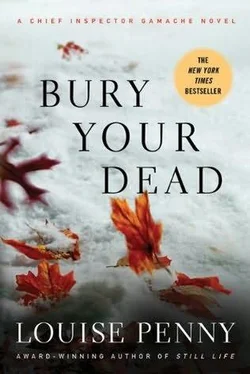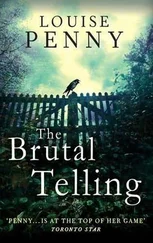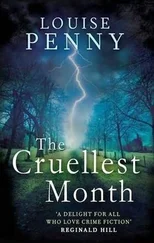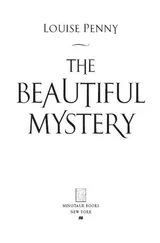Louise Penny - Bury Your Dead
Здесь есть возможность читать онлайн «Louise Penny - Bury Your Dead» весь текст электронной книги совершенно бесплатно (целиком полную версию без сокращений). В некоторых случаях можно слушать аудио, скачать через торрент в формате fb2 и присутствует краткое содержание. Жанр: Старинная литература. Описание произведения, (предисловие) а так же отзывы посетителей доступны на портале библиотеки ЛибКат.
- Название:Bury Your Dead
- Автор:
- Жанр:
- Год:неизвестен
- ISBN:нет данных
- Рейтинг книги:4 / 5. Голосов: 1
-
Избранное:Добавить в избранное
- Отзывы:
-
Ваша оценка:
- 80
- 1
- 2
- 3
- 4
- 5
Bury Your Dead: краткое содержание, описание и аннотация
Предлагаем к чтению аннотацию, описание, краткое содержание или предисловие (зависит от того, что написал сам автор книги «Bury Your Dead»). Если вы не нашли необходимую информацию о книге — напишите в комментариях, мы постараемся отыскать её.
Bury Your Dead — читать онлайн бесплатно полную книгу (весь текст) целиком
Ниже представлен текст книги, разбитый по страницам. Система сохранения места последней прочитанной страницы, позволяет с удобством читать онлайн бесплатно книгу «Bury Your Dead», без необходимости каждый раз заново искать на чём Вы остановились. Поставьте закладку, и сможете в любой момент перейти на страницу, на которой закончили чтение.
Интервал:
Закладка:
They agreed.
“I can guarantee you,” René looked Gamache in the eye. “Samuel de Champlain is not buried there.”
“How can you be so certain?”
“When you arrived at the Château, did you happen to notice the statue of Champlain out front?”
“I did. Hard to miss.”
“ C’est vrai . That’s not simply a monument to the man, but it marks the exact spot he died.”
“As exact as we can get, anyway,” said Jean. René shot him a small, annoyed look.
“How do you know that’s where he died?” Gamache asked. Now it was Émile’s turn to answer.
“There’re reports written by his lieutenants and the priests. He died after a short illness on Christmas Day, 1635, during a storm. It’s one of the few things we know about Champlain without a doubt. The fortress was right there, where the statue is.”
“But he wouldn’t have been buried right where he died, would he?” asked Gamache.
René unfolded another map or, at least, a reproduction and placed it on top of the modern city map. It was little more than an illustration.
“This was drawn in 1639, four years after Champlain died. It’s not much different than the Québec he would have known.” The map showed a stylized fort, a parade grounds in front, and a scattering of buildings around. “This is where he died.” His finger landed on the fort. “It’s where the statue now stands. And this is where they buried Champlain.”
René Dallaire’s thick finger pointed to a small building a few hundred yards from the fort.
“The chapel. The only one in Québec at the time. There’re no official records but it seems obvious Champlain would have been buried there, either right in the chapel or in a cemetery beside it.”
Gamache was perplexed. “So, if we know where he was buried, what’s the mystery? Where is he? And why aren’t there any official records of the burial of the most important man in the colony?”
“Ahh, but nothing is ever straightforward is it?” said Jean. “The chapel burned a few years later, destroying all the records.”
Gamache thought about that. “A fire would burn the records, yes, but not a buried body. We should still have found him by now, no?”
René shrugged. “Yes, we should have. There’re a number of theories, but the most likely is that they buried him in the cemetery, not the chapel, so the fire wouldn’t have disturbed him at all. Over time the colony grew—”
René paused but his hands were expressive. He opened them wide. The other two men were also silent, eyes down.
“Are you saying they put a building on top of Champlain?” Gamache asked.
The three men looked unhappy but none contradicted him until Jean spoke.
“There is another theory.”
Émile sighed. “Not that again. There’s no proof.”
“There’s no proof of any of this,” Jean pointed out. “I agree it’s a guess. You just don’t want to believe it.”
Émile was silent. It seemed Jean had made a direct hit. The little man turned to Gamache. “The other theory is that as Quebec City grew there was a huge amount of building work, as René says. But along with it was excavation, digging down beneath the frost line before they put up the new buildings. The city was booming, and things went up in a hurry. They didn’t have time to worry about the dead.”
Gamache was beginning to see where this was going. “So the theory is that they didn’t build on top of Champlain.”
Jean shook his head slowly. “No. They dug him up along with hundreds of others and dumped him in a landfill somewhere. They didn’t mean to, they just didn’t know.”
Gamache was silent, stunned. Would the Americans have done that to Washington? Or the British to Henry the Eighth?
“Could that have happened?” He turned, naturally, to Émile Comeau who shrugged, then finally nodded.
“It is possible, but Jean’s right. None of us wants to admit it.”
“To be fair,” said Jean. “It is the least likely of the theories.”
“The point is,” said René, looking at the map again. “This is the limit of the original settlement in 1635.” He twirled his finger over the old map, then swept it aside and found the same place on the modern map. “Pretty much from where we’re sitting now, in the Château, to a radius of a few hundred yards. They’d keep it small. Easier to defend.”
“And what would the rest have been?” asked Gamache, beginning to understand what they were saying.
“Nothing,” said Jean. “Forest. Rock.”
“And where the Literary and Historical Society is now?”
“Woods.” René brought the old map out and placed his finger on a big blank space, far from any habitation.
Nothing.
There was no way they’d have buried Champlain that far from civilization.
There was no way the father of Québec could be in the basement of the Lit and His.
“So,” Gamache leaned back. “Why was Augustin Renaud there?”
“Because he was mad?” asked Jean.
“He was you know,” said Émile. “Champlain loved Québec, to the exclusion of everything else in his life. It was all he knew, all he lived for. And Renaud loved Champlain with the same devotion. A devotion bordering on madness.”
“Bordering?” asked René. “He was the capital of the state of madness. Augustin Renaud was the Emperor of it. Bordering,” he muttered.
“Maybe,” said Émile, staring down at the old map again. “Maybe he wasn’t looking for Champlain. Maybe there was another reason he was there.”
“Like what?”
“Well,” his mentor looked at him. “It is a literary society. Maybe he was looking for a book.”
Gamache smiled. Maybe. He got up and paused as the waiter fetched his coat. Looking down at the modern map he noticed something.
“The old chapel, the one that burned. Where would it have been on this map?”
René put out his finger one more time and pointed.
It landed on the Notre-Dame Basilica, the mighty church where the great and good used to pray. As the waiter helped Gamache into his parka René leaned over and whispered, “Speak to Père Sébastien.”
Jean-Guy Beauvoir waited.
He wasn’t very good at it. First he looked as though he didn’t care, then he looked as though he had all the time in the world. That lasted about twenty seconds. Then he looked annoyed. That was more successful and lasted until Olivier Brulé arrived a quarter hour later.
It had been a few months since he’d last seen Olivier. Prison changed some men. Well, it changed all men. But externally some showed it more than others. Some actually seemed to flourish. They lifted weights, bulked up, exercised for the first time in years, ate three square meals. They even thrived, though few would admit it, on the regimen, the structure. Many had never had that in their lives, and so they’d wandered off course.
Here their course was clearer.
Though most, Beauvoir knew, withered in confinement.
Olivier walked through the doors, wearing his prison blues. He was in his late thirties and of medium build. His hair was cut far shorter than Beauvoir had ever seen, but it disguised the fact he was balding. He looked pale but healthy. Beauvoir felt a revulsion, as he did in the presence of all murderers. For that’s what he knew in his heart Olivier was.
No, he sharply reminded himself. I need to think of this man as innocent. Or at least, as not guilty.
But try as he might he saw a convict.
“Inspector,” said Olivier, standing at the far end of the visitors’ room, unsure what to do.
“Olivier,” said Beauvoir and smiled, though judging by the look on Olivier’s face it was probably more of a sneer. “Please. Call me Jean-Guy. I’m here privately.”
Читать дальшеИнтервал:
Закладка:
Похожие книги на «Bury Your Dead»
Представляем Вашему вниманию похожие книги на «Bury Your Dead» списком для выбора. Мы отобрали схожую по названию и смыслу литературу в надежде предоставить читателям больше вариантов отыскать новые, интересные, ещё непрочитанные произведения.
Обсуждение, отзывы о книге «Bury Your Dead» и просто собственные мнения читателей. Оставьте ваши комментарии, напишите, что Вы думаете о произведении, его смысле или главных героях. Укажите что конкретно понравилось, а что нет, и почему Вы так считаете.











